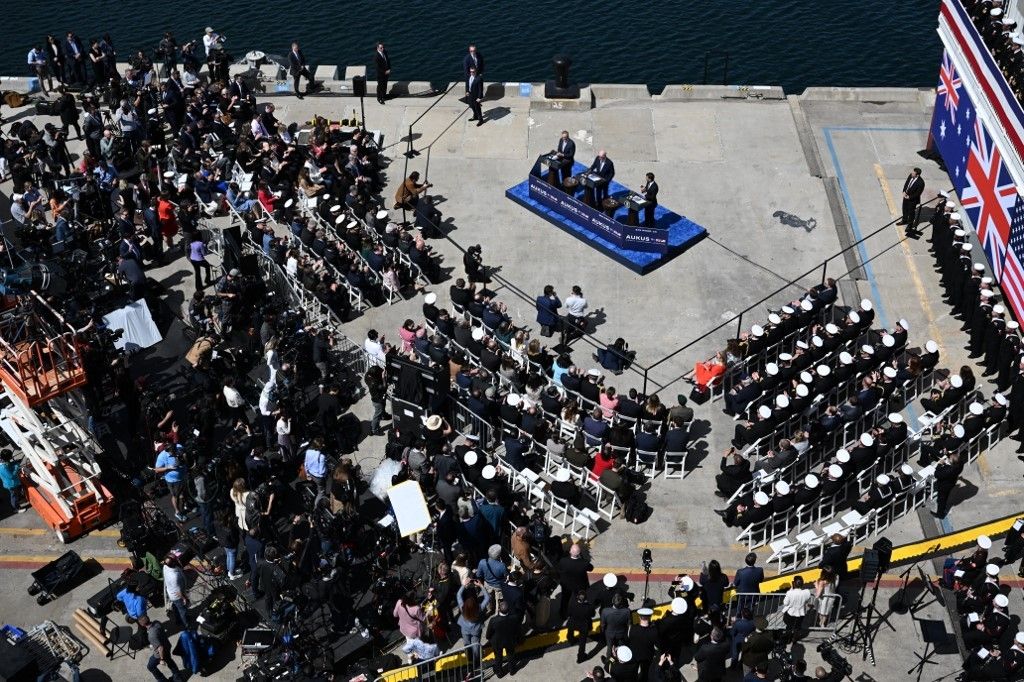
US President Joe Biden (C), British Prime Minister Rishi Sunak (R) and Australian Prime Minister Anthony Albanese (L) hold a press conference during the AUKUS summit on March 13, 2023, at Naval Base Point Loma in San Diego California. AUKUS is a trilateral security pact announced on September 15, 2021, for the Indo-Pacific region. AFP / Jim Watson
Noting the importance of partnerships and collaboration within the region, the Philippines expressed appreciation to AUKUS partners – composed of Australia, the United Kingdom, and the United States – for the reassurance that recent developments will help ensure regional peace and stability.
The statement comes just days after Australia announced plans to purchase up to five US nuclear-powered submarines in the next years and work with the UK and the US to build its own vessels.
“For the Philippines, it is important that partnerships or arrangements in the Indo-Pacific region, such as AUKUS, support our pursuit of deeper regional cooperation and sustained economic vitality and resilience, which are essential to our national development and to the security of the region,” the Department of Foreign Affairs said in a statement on Thursday.
“We consider it important for these arrangements to uphold ASEAN’s central role in the regional security architecture, and reinforce an international rules-based order that underpins regional security and development.”
Australian Prime Minister Anthony Albanese said the plan to purchase new submarines and vessels would be its “biggest” investment in its defense sector.
On Tuesday, Australian Ambassador to the Philippines HK Yu already thanked Manila for supporting Canberra in becoming a “more capable defense partner in the region.”
Armed Forces of the Philippines Chief of Staff Gen. Andres Centino also held a phone call meeting with Australian Chief of Defense Force General Angus Campbell on Monday, where Campbell assured Centino that they would further coordinate regarding the AUKUS partnership.
Nuclear-powered submarines to aid regional stability
The new development in AUKUS allows Australia to start replacing its diesel-powered submarines with nuclear-powered ones. The first batch will be purchased from the US through the 2030s but Australia also wants to start building and producing its own at least by the early 2040s.
The Philippines in its statement on Thursday called on AUKUS partners to ensure that their plans are within the international nuclear safeguards and non-proliferation standards of the International Atomic Energy Agency.
In a factsheet published by The White House on March 13, AUKUS partners said the produced radioactive waste generated and spent nuclear fuel will be managed by Australia. Both the US and the UK will be supporting Australia in the transition.
“Australia will manage these materials in accordance with its nuclear non-proliferation and other international obligations and commitments,” the factsheet read.
Australia will also not acquire nuclear weapons nor produce nuclear fuel. Instead, the UK and the US will be handing over “nuclear material in complete, welded power units that will not require refueling during their lifetime.”
Whatever nuclear fuel Canberra will receive are also not viable for nuclear weapons if not processed, which Australia does not have the facilities to do so.
United States Assistant Secretary of State for East Asian and Pacific Affairs Daniel Kritenbrink on Monday told the press that the main goal of AUKUS is to “enhance stability… amid rapidly shifting global dynamics.” For the US, it may be through strengthening treaty alliances, by engaging it activities that demonstrate ASEAN centrality, among other efforts for the region.
“We’re using all of these different flexible overlapping mechanisms to again, build a collective capacity part of partners who are all committed to the same goal, peace and stability across the region and to bolstering the rules based order that has benefited us all for many, many decades now,” Kritenbrink said.
